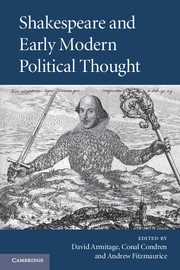Book contents
- Frontmatter
- Contents
- List of contributors
- Acknowledgements
- List of citations and abbreviations
- Introduction
- PART I CONTEXTS
- PART II THE COURT
- PART III THE COMMONWEALTH
- 10 Putting the city into Shakespeare's city comedy
- 11 Talking to the animals: persuasion, counsel and their discontents in Julius Caesar
- 12 Political rhetoric and citizenship in Coriolanus
- 13 Shakespeare and the best state of a commonwealth
- Afterword: Shakespeare and humanist culture
- Index
10 - Putting the city into Shakespeare's city comedy
Published online by Cambridge University Press: 18 January 2010
- Frontmatter
- Contents
- List of contributors
- Acknowledgements
- List of citations and abbreviations
- Introduction
- PART I CONTEXTS
- PART II THE COURT
- PART III THE COMMONWEALTH
- 10 Putting the city into Shakespeare's city comedy
- 11 Talking to the animals: persuasion, counsel and their discontents in Julius Caesar
- 12 Political rhetoric and citizenship in Coriolanus
- 13 Shakespeare and the best state of a commonwealth
- Afterword: Shakespeare and humanist culture
- Index
Summary
At first glance, The Merry Wives of Windsor, described by H. J. Oliver as a ‘portrait of life in an English country town’, is not Shakespeare's most obviously ‘political’ play. With the exception of Falstaff, the play's characters are almost invariably reduced by critics to their social and economic functions. For example, in her excellent article on ‘Falstaff and the Comic Community’, Anne Barton convincingly traces the genealogy of Falstaff back to Aristophanes while somewhat lazily depicting the indigenous community of Windsor as ‘small town’, ‘middle class’ and ‘bourgeois’. This echoes George K. Hunter's description of the comedy as quintessentially ‘bourgeois’ and Oliver's influential characterisation of the play as a ‘citizen comedy’ in the manner of Dekker, Jonson, Middleton and Massinger. Of course, the major difference between The Merry Wives of Windsor and (for example) The Shoemaker's Holiday, Eastward Ho!, A Chaste Maid of Cheapside or The City Madam is that city comedies are invariably situated in London: that is, in a ‘real’ city with ‘real’ citizens. Shakespeare, apparently perversely, set his only attempt at the most popular and commercially successful genre of the day in a provincial town of a few thousand souls. Even as a commentary on nascent capitalist and class antagonisms, the play seems half-baked and anomalous.
Recent developments in the historiography of early modern England make such dismissals of the play not only less plausible but also anachronistic. The first of these is the well-known interest in popular political consciousness and agency beyond the ‘summit’ of ‘court’ and ‘county’.
- Type
- Chapter
- Information
- Shakespeare and Early Modern Political Thought , pp. 197 - 216Publisher: Cambridge University PressPrint publication year: 2009
- 6
- Cited by

